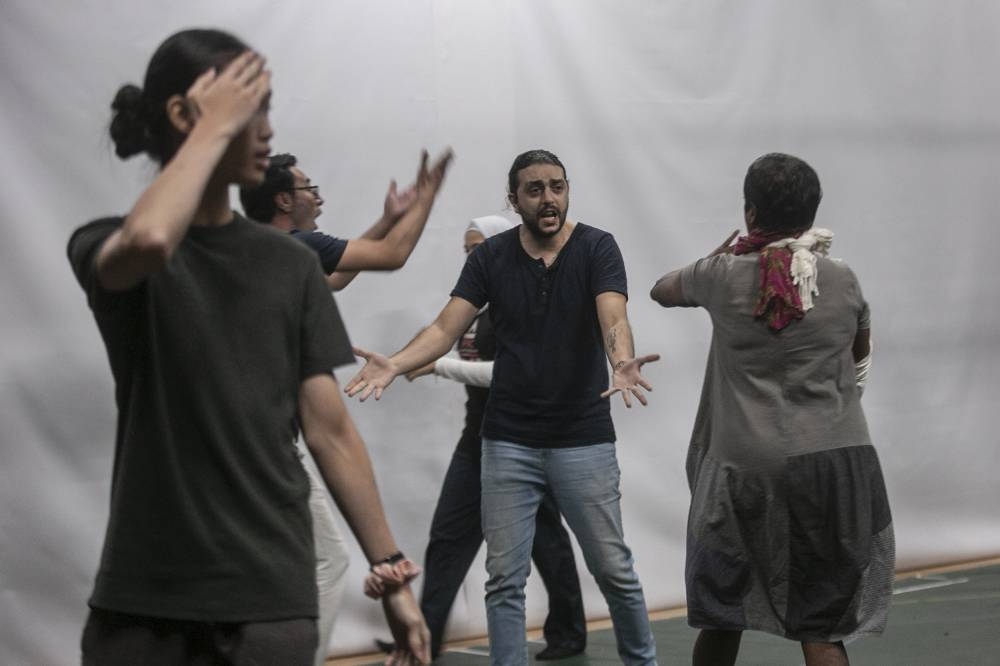PETALING JAYA, July 21 — With just days left to opening night, the cast and crew of And Then Came Spring are abuzz with energy in preparation for the show.
As rehearsals for the first scene of the play begins, the unassuming space suddenly turns into a hospital in Afghanistan.
A patient with a cast morosely sits in the corner as harassed health workers scurry about, before a father-to-be bursts onto the scene wielding a gun.
The scene's mix of comedy and tense drama makes for a highly theatrical experience indeed.
"They came with zero background in theatre and acting, but now they can see their own talent,” said Afghan playwright and director Saleh Sepas, with a touch of pride.
"They just needed the chance to show what they can do.”

And Then Came Spring is the latest performance by Parastoo Theatre, a refugee-led troupe founded by Saleh in 2017, and is a collaborative effort with local theatre veterans Instant Cafe Theatre (ICT).
The play revolves around two young Afghans, 14-year-old child bride Nazanin and her eight-year-old sister Laily, as they journey from Kabul to Kuala Lumpur.
Speaking to Malay Mail in between leading rehearsals, Saleh said that while the play focuses on issues faced by women in Afghanistan, its themes are universal.
"These issues (child marriage, domestic violence, gender-based oppression) are not just refugee challenges, they’re human challenges.
"This is the power of theatre; onstage there is no difference between refugees and non-refugees, no xenophobia, no gaps,” he said.
Strengthening communities through art
Born and raised in Afghanistan, Saleh arrived in Malaysia six years ago with his wife and their three young children.
The emotional strain of fleeing persecution and the financial challenge of providing for his family left Saleh depressed at first.
With his background — a fine arts education from Kabul University and a decade of experience in writing for the media — Saleh decided theatre might be a way to support his family as well as the wider community.
"I thought, why not use the knowledge I have to do something useful,” he explains.
"We started with the Afghan community, but as we began doing shows, more and more people from other communities wanted to join in as well.”
He added that a primary method of choice for his work is Theatre of the Oppressed (TO), a set of theatrical techniques which seek to promote social change through the arts.
Developed by Brazilian theatre-maker Augusto Boal in the 1950s, TO is a hybrid of art and education — both actors and audiences use performance as a means to examine and unpack the social issues affecting their communities.
While And Then Came Spring is a more traditional play, it is clear that TO has had an impact on the way Saleh approaches theatre.
"Many people think art isn’t important, but this is a way for us to talk about our pain and challenges,” Saleh said.
"If we don’t talk about these problems, if we keep them hidden away, how are we to find solutions?”
"To me, art is about creating dialogue between communities, and facilitating communities to find their own solutions - it gives power to the powerless.”
Breaking down stereotypes
Portrayals of refugees in the popular media tend to follow a fairly standard narrative, with images of huddled masses designed to provoke pity, or at worst, spark fear.
"When you hear the word refugee, many people think of one word — need,” said actress Farzana Hussaini,19.
"People only see the helplessness (of refugees) but never the other side of us; they don’t see that we are also doctors, engineers, artists, we are so many things besides ‘helpless’.
"The label ‘refugee’ is just one part of the many other identities we have.”
Farzana plays Nazanin the child-bride in And Then Came Spring, and is an Afghan refugee herself.
She added that she dislikes talking about her refugee status because not many even understand what the word means.
"It just gets weird, you know,” she said with a sad laugh.
"At most, they know that you’ve been through war, but sometimes it’s like, people can’t see you for the human that you are.
"I’m hoping that by acting these stories out, I can try showing others that we’re just like them — it’s just that we might have gone through some extreme experiences.”
It’s a sentiment that Saleh brings up as well, adding that the collaborative process of theatre in itself is a tool for forging human connections.
"It can be difficult sometimes, this work, but it is meaningful to me.
"There is a joy in seeing different communities of people coming together, regardless of whether we are from Afghanistan, Palestine, Myanmar or Malaysia,” he said.
Saleh pauses for a bit when I ask him what drives his work, before a fellow Parastoo member gives him the word he’s looking for: justice.
"All humans have a responsibility, and I have a responsibility to voice out these issues,” he said.
"I cannot bring myself to stay silent and pretend nothing is happening to the people and communities around me.
"This is the art of life — even if you don’t have anything, you still try to do something (to make a change).
And Then Came Spring opens this Friday (July 22) at the the Damansara Performing Arts Centre (DPAC) and runs till July 24.
Malay Mail is the media partner for the play.
Tickets to the show can be purchased here at DPAC’s website here.






















